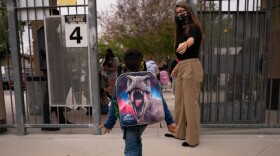The people who filled the Shiley Theatre at the University of San Diego came to hear a person who is remarkable in many ways. U.S. Supreme Court Justice Sonia Sotomayor is one of the few women to have served on the nation’s highest court. She is the first Hispanic of any gender to serve on it.
She also has a compelling bootstraps story that goes back to a childhood in a housing project in the South Bronx. Near the start of her speech, Sotomayor peered into the audience to point out someone who she said was "just like her."
"And Rosie, where are you?” Sotomayor said as she scanned the audience. “She's a law student… the child of a mom who delivered newspapers to get her through college. And I wrote this book for you."
Sotomayor came to San Diego to promote her memoir, “My Beloved World.” She also spoke about the law and even gave some advice to lawyers who may argue before the Supreme Court.
Her memoir tells of the tough upbringing of a Puerto Rican kid: A Newyorican, as she calls herself. She writes of her parents’ troubled marriage and her dad's alcoholism. She suffered from childhood diabetes and had to give herself insulin shots at the age of eight.
When it came time for questions, the audience wanted to ask about Sotomayor, the woman. What's it like to be a woman in a field dominated by men?

"You will find, as you go into the profession, that you will be in a room where a guy turns to you and says, ‘Please go get the coffee.’ Those are hard moments," she said.
But she also told of the senior partner in her law firm who said to that same guy, “Sonia is a lawyer. We have assistants who get coffee.”
She followed with a line that drew audience laughter.
"Now... that's too bad for the assistants if they happen to be women,” said Sotomayor. “And I think for those of you who are women here, you may have to think and say, we get our own coffees."
While she may get her own coffee, Sotomayor said Supreme Court justices don't live in seclusion. She said this in response to a question about whether justices, in their rulings, were influenced by public opinion.
"You have to know that we read the newspapers and watch TV,” she said. “So it's not that we're unaware."
But while public opinion is not ignored, Sotomayor said it might have to be disregarded.
"In the end, if we're basing our opinions on public opinion, our work won't last. No judge and no justice aspires to write opinions that won't last the ages," she said.
Sotomayor was asked if she rules on cases, wondering how they might affect the Latino community. She said no. But she does think about the people who are going to lose the case.
"What lawyers do best is what they do in their office, when they get people to find compromises that help work a problem out,” said Sotomayor. “Once they stay in court, and ask us to find the solution, that loser is going to feel deprived of something."
Sotomayor even gave some advice to people arguing cases before the court. Oral arguments are often the most dramatic part of a case. But she said by that time, justices have read the arguments thoroughly and no new arguments can be presented.
"If you haven't told us what your arguments are, if all that reading has failed to do so, you ain't gonna do it in the courtroom!” she said. “What you can do, when a judge asks you a question, you identify what's troubling the judge and you jump to your strongest point that answers that concern."
Sonia Sotomayor is considered a member of the liberal block of judges on the court. But the people who attended her talk at the University of San Diego, and came to buy her book, saw her as an inspiration.
Gonzalo Quintero was one a the many Hispanic members of the audience who held Sotomayor up as role model.
"You know… living the dream and setting an example for women of all color. I can't say that I aspire to be her, but I aspire to set an example the way she has,” said Quintero.
In her book, Sotomayor describes a scene in which she tells her Puerto Rican mother in the early 90s she was becoming a federal judge. Her mother said she must be getting a big pay raise. No, Sonia said, she'd be making less than she made as a lawyer. But you'll be traveling more and meeting interesting people, her mother insisted. Sonia said that wasn’t the case either.
At that point Sotomayor's stepfather came to her defense saying, “It must be very important work.”






